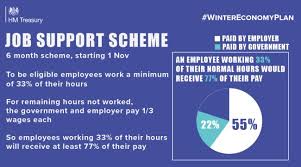What does the Job Support Scheme really mean for employers?

Having read the detail of Chancellor’s announcement yesterday we’ve put together the main points for your information. The Job Support Scheme is potentially not as helpful to employers as it first sounded.
The main pointers of the scheme are
- The government have said that further guidance “will be published shortly”·
- The Scheme opens on 1 November 2020 and closes in April 2021 (no specific date given)·
- You can use this Scheme even if you as the employer or the employee concerned have not previously used the furlough scheme (Job Retention Scheme)·
- The Scheme is only open to those businesses where turnover is lower now than before experiencing difficulties from COVID19·
- Employees must have been on your payroll on or before 23 September 2020 (so a Real Time Information (RTI) submission must have been made before 23 September 2020.·
- Employees will be paid for 77% of their contracted hours·
- The Government will pay a third of the hours not worked by an employee up to a cap of £697.92 per month·
- In the first 3 months of the Scheme the employee must work 33% of their usual hours. The government will review the Scheme in three months.·
- Employees can cycle on and of the Scheme, working a different pattern of work or hours BUT each short time working arrangement must cover a minimum period of 7 days·
- The employer will claim on line through gov.uk from December 2020.
- Grants will be paid retrospectively
What does the Grant cover?
- For every hour NOT WORKED by the employee both the Government and the employer will pay a third each of the usual hourly rate of that employee. The Government contribution will be capped at 697.92 a month.·
- Grant payments will be made in arrears, reimbursing the employer
- The grant WILL NOT cover employer NI or pension contributions. These remain payable by the employer.·
- Guidance on what will be seen s “usual wages” is not yet issued other than it will be a “similar methodology for the Job Retention Scheme”
- Employees who have previously been furloughed will have their “underlying usual pay or hours used to calculate wages, not the amount they were paid whilst on furlough.·
- Employers must pay the contracted wages for the hours worked.
- The Government’s expectation is that employers WILL NOT top up at their own expense employee’s wages above the two thirds contribution to hours not worked.
What does reduced hours mean?
- The employee must work AT LEAST 33% of their usual hours·
- The employee must be paid their contracted rate for hours worked
- The employee will be paid up to two thirds of their usual wage for the time not worked·
- Employees cannot be made redundant or put on notice of redundancy during the period within which their employer is claiming the grant for the employee (in other words if your employee is on notice of redundancy you will pay them 100% of their pay and receive no grant from the Government).
What do you need to do from an employment perspective?
- You will need to agree the new short time working with their employees in writing
- HMRC can demand to see the written evidence
As things change we’ll keep an eye on the detail and let you know as soon as possible.
If you need help with how to manage your employees using the Job Support Scheme give us a call on 01706 565332 or use the contact form and we’ll come back to you straight away.
Metis HR is a professional HR Consultancy based in the North West of England supporting clients across the country. We specialise in providing outsourced HR services to small and medium-sized businesses. Call us now on 01706 565332 to discuss how we may help you.

